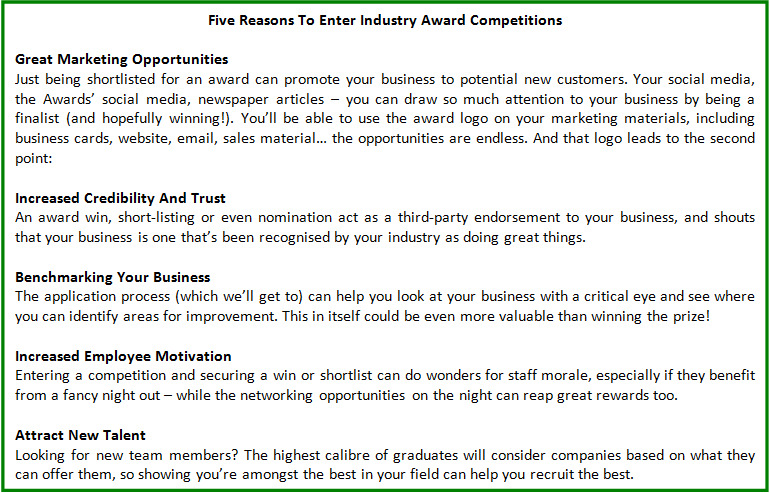As you might have seen on our recent blog post, eBusiness Guru has been shortlisted in three categories for the eCommerce Awards 2018, which take place on Wednesday 26th September. We’re incredibly proud of this achievement, and we’re excited to be attending the ceremony to find out if we can take the achievement one step further by winning one or more of the categories.
When we were at Linn Academy last week, we had many people asking how we had gone about entering the awards, and what was involved in the process, so we thought we’d put together some pointers from what we’ve learned through entering the eCommerce Awards. It’s not a definitive guide – just a friendly talk about our experience. When we’ve a few more award nominations and a win or two under our belt, we’ll think about a definitive guide to success!
How much work is involved though?
It’s not a quick, or easy process. Like all good things, winning an award (that is worth winning!) doesn’t come easy. It isn’t a case of ticking a few boxes, entering your business name and clicking to enter. There will be significant amounts of work required to ensure your business is sufficiently represented. Depending on which competition you’re considering entering, and how many categories, you might be looking at anything from a short essay of 1000 words per category entry to 24 pages of questions (We are looking at you, Queen’s Awards for Enterprise). So make sure you allocate the time, and resources, to do your entry justice.
Planning and Research
We’ve heard this our entire lives, but it’s a cliché because it’s also true – perfect preparation prevents poor performance. Choosing the right awards for your business and your industry is paramount if your entry is going to be in with a chance. Take a look at the List of UK Business Awards – there’s a LOT of competitions, so pick the right one(s) for you. Decide whether you want to pay for your entry or not, and consider how much tickets for the ceremony will cost you – if it’s not feasible, reconsider.
Once you’ve found the competition you want to go for, make sure you choose the right categories for your business – if you’re going to be shortlisted, you’re going to need to be doing something outstanding, and have an entry that’s engaging, eye-catching and easy to read. Even the shortlisting panel are going to be pressed for time, let alone the judges, so don’t waste a chance by putting in an entry in which you’ve only a tiny chance of being considered for. Look at which companies won last year, see why they won, then make sure you feel confident to compete with companies of that calibre.
 Mark the deadline on your calendar, then understand exactly how much work is required and break the task into manageable chunks so you can carve out the time you need, and so that there’s no panic the week of the deadline. Make sure you leave contingency time too – you might end up with an unexpected circumstance outside your control that eats into your time for writing your entry. And it’s not just writing – some competitions might require a video, or other materials to be included with your entry – so make sure you’ve planned for that.
Mark the deadline on your calendar, then understand exactly how much work is required and break the task into manageable chunks so you can carve out the time you need, and so that there’s no panic the week of the deadline. Make sure you leave contingency time too – you might end up with an unexpected circumstance outside your control that eats into your time for writing your entry. And it’s not just writing – some competitions might require a video, or other materials to be included with your entry – so make sure you’ve planned for that.
Building Your Entry
Once you understand what you need to put in your entry, write your first draft. Your language needs to be compelling, and each point you make needs to be backed up with evidence – so if you’re saying you sell worldwide, give examples of where, and what percentage are overseas sales. Be succinct, but don’t be modest. Say you’re great, but make sure you show the judges why – they won’t just take your word for it!
 When you’re satisfied, have someone read your entry. Depending on your resources (and how much you want to win the award) you might employ a professional writer to help you, but if you don’t have that available, make sure whoever proofreads it and gives you feedback has excellent English language skills – don’t just rely on Word’s spellchecker and Grammarly!
When you’re satisfied, have someone read your entry. Depending on your resources (and how much you want to win the award) you might employ a professional writer to help you, but if you don’t have that available, make sure whoever proofreads it and gives you feedback has excellent English language skills – don’t just rely on Word’s spellchecker and Grammarly!
It’s likely to be an advantage if your reader isn’t in your industry – the questions your reader asks are questions you need to answer in your entry. Don’t assume that the judges will know your industry in-depth – they might know about eCommerce, for example, but they might not have heard of your multi-channel system, so if you’re naming Linnworks, give a short explanation of what it is.
When you’ve had your feedback, create your second draft. And possibly, a third, fourth and fifth too. Each time you make significant changes, save your document in different versions, in case you need to revert. And while we’re at it… back up your work. Don’t rely on it being just saved to your PC – back up to your Google Drive, Dropbox, or an external hard drive. It takes seconds but can prevent a world of pain if your PC fails. (And this doesn’t just apply to competition entries –it’s good advice full stop!)
When you’ve polished your entry, and proofread it at least twice, aim to submit it, with any additional requirements such as your company logo, accounting details etc no later than 12 hours before the deadline. This might seem excessive, but leaving plenty of contingency time prevents panic in case of dreaded technology failure!
After The Shortlisting
Be prepared – when you have put all the required work in, and you get the good news that you’re shortlisted, that’s not where the hard work ends. To really make the most of your nomination/shortlisting/win, you need to be shouting about it – so, there’s social media content to create, blog posts, updating your marketing materials… It can be overwhelming if you’re not prepared, particularly if you haven’t planned the time to create that content.
Well, we’re projecting with this one, as our special evening ison Wednesday – but we recommend checking the dress code and getting your outfit sorted early, and booking hotels if you need them. Your team should be excited – make sure they’re keeping their fingers crossed! Above all, enjoy the evening, whether you win or not – you’ve still been counted amongst the best, so you should still feel proud and enjoy the evening, before returning to the office and thinking about planning your next entry.
So there you have it – our guide to entering industry awards. It’s not meant to be a definitive guide – it’s more to give you an idea of how much work is involved and how to go about it. If you decide to go for it, we wish you the best of luck – and we hope you’ll wish us the same for next week!


